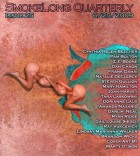Dan, we’re incredibly honored and touched that you sent this to us. Rather than asking the kind of questions we usually would, I’d like to make a place where you can just talk about Sheila. I encourage folks to read your excellent article at The Rumpus, What Happened to Sheila and to pick up Sheila’s “Lies Will Take You Somewhere” (linked to the right), but what else should people know? What would Sheila want people to know?
It’s been six months now since my wife Sheila Schwartz died of ovarian cancer, and I still feel like I’m at the very earliest stages of processing that loss, if such a thing is even possible. “Processing:” what a bland, mechanical word.
We were married for 20 years; we first met when I was a student in her fiction class at Northwestern University, and our marriage and our writing lives were deeply entwined from the very beginning. She was my first reader, and I was hers; we copy-edited one another’s manuscripts, and made suggestions, and argued fine points. We were critics and fans of each other, and I could never imagine what it would be like to try to write something without her here.
Now, unfortunately, I’m in that situation. I haven’t written very much, to tell the truth. The two or three stories that I’ve tried to put together since her death—including “The Hobblers”—are fictional recreations of the months that preceded her passing, which is basically where I’m still at. Trying to write through it, or around it, or into it, I’m not sure of the direction. A lot of times, I worry that I won’t be able to.
Most of my writing time these past few months has been spent trying to get her posthumous work together. She had just finished a book called IN THE INFUSION ROOM, a novel-in-stories that focuses on cancer patients, which is a lot funnier and more good-humored than it sounds. Sheila was the most hilarious person I’ve ever met, and she could find something to laugh about even in the bleakest times, and I pray that I can find a publisher for that last book.
She had also started work on yet another collection of short stories, which would have included her best known story, the O. Henry-winning “Afterbirth.” She was about halfway through that book, and in fact she had started a story just about a week before she died. Here it is. You could say it’s a kind of short-short in itself.
The Exact Same Time
Cara and her mother were dying at the exact same time. Who would have believed it? In one room, her mother tossed, turned and paced. In the other room, Cara, on her deathbed, remembering, remembering, climbing vast peaks of memory—first sex, first love, first time she misbehaved, first spanking (only spanking), first fear of the ocean, heights, closed spaces, open spaces, of performance, failure, failure and performance, first fear of dying. Which wasn’t anything like she’d imagined it would be.
Could you take your fears to the underworld? Her mother was taking her nagging. She was in there criticizing the thin air. Nothing was ever right. Whose fault was that? Cara’s.
It was all a great big competition. Today, for instance, Cara got five visitors. Her mother, just one, an old friend who used to talk to her over the fence as they hung laundry.
Cara’s mother couldn’t stand losing, never could. But what could she do? People hand their sympathy to cancer before Alzheimer’s. If they have to choose.
—-So. What to do with this funny, furious little fragment ? The last little missive, filled with a bright sense of ironic life and light, a bit of gallows humor and beauty. Those “vast peaks of memory”! How lovely, and how terrifying.
You ask what Sheila would want people to know, and I can’t answer that. I do know what she would say about this story, “The Hobblers,” though. She always teased me because the wives in my stories would always appear in a short scene with one or two lines of dialogue, at just the right moment to deliver some advice, or criticism, or pithy wisecrack. “I’m not like that,” she would always say. “That’s the wife you wish you had, popping up on your shoulder like Jiminy Cricket.”
So—just for the record—the wife in “The Hobblers” isn’t Sheila, though the garden out back is definitely ours. Watching those flowers come up this spring without her to see them was one of the worst experiences of my life.



 The core workshop of SmokeLong Fitness is all in writing, so you can take part from anywhere at anytime. We are excited about creating a supportive, consistent and structured environment for flash writers to work on their craft in a community. We are thrilled and proud to say that our workshop participants have won, placed, or been listed in every major flash competition. Community works.
The core workshop of SmokeLong Fitness is all in writing, so you can take part from anywhere at anytime. We are excited about creating a supportive, consistent and structured environment for flash writers to work on their craft in a community. We are thrilled and proud to say that our workshop participants have won, placed, or been listed in every major flash competition. Community works.